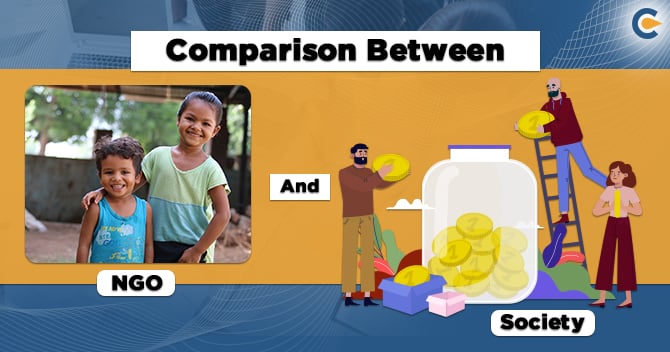Two significant associations are prevailing in the current scenario, which works like silver bullets for refining the world. Non-governmental organisations and societies are two significant prospects of associations that ardently work for the betterment of people, whereas various distinctions separate an NGO and Society. On the other side, there exist a significant number of common factors which arranges them in a system. They both work for a developed civilisation and happiness of every individual who is in trouble. These organisations work on the rough edges without deeming their profit.
NGOs – A Broader Prospect
NGO is an extensive term as compared to society. Non-governmental organisations comprise of trust and society within their structure. NGO operates two pivotal roles which are advocacy and service roles. The non-governmental organisation (NGO) is a term that has become widely accepted as referring to a legally constituted; non-governmental organisation emerged by the natural or legal persons with no participation or representation by any government.
In cases where NGOs are totally funded or partially by the governments, the NGO maintain its non-governmental status and does not include government[1] representatives from membership in the organisation. Unlike the term intergovernmental organisation, “non-governmental organisation” is a term in general use but is not a legal definition. In many jurisdictions, these types of organisation are defined as “civil society organisations” or referred to by other names. Non-governmental organisations are a heterogeneous group. There is a long list of acronyms has developed around the term “NGO”.These include:
- CSO: stands for civil society organisation
- DONGO: stands Donor Organized NGO;
- ENGO: stands for environmental Non-profit Organisation, such as Global 2000;
- GONGOs: stands for government-operated NGOs, that has been set up by governments to look like NGOs in order to qualify for any outside aid or promote the interests of the government in question;
- INGO: stands for international NGO; Oxfam is an international NGO
- QUANGOs: stands for quasi-autonomous non-governmental organisations, such as the International Organization for Standardization (ISO). The ISO is not purely an NGO, as its membership is by the nation, and each and every nation is represented by what the ISO Council determines to be the ‘most broadly representative’ standardisation body of a nation. That body might itself be a non-governmental organisation;
Like for example, the U.S. is represented in ISO by the American National Standards Institute, that is independent of the federal government. Whereas, other countries can be represented by national governmental agencies; this is the trend in Europe.)
- TANGO: short for technical assistance NGO;
- GSO: Grassroots Support Organization
- MANGO: short for market advocacy NGO
Read our article:Society Registration in India: Know the Entire Procedure and List of Documents Required
Overview on the Legal Status of NGO’s
The legal form of NGOs is diverse and depends upon the homegrown variations in each country’s laws and practices. There is four main family groups of NGOs can be found worldwide, those are as follows:-


Society- An Essential part of NGO
Society is not the primary organisation in itself, but an element of NGOs. There are two essential forms in which NGOs practice their functions. Firstly, they work as trustees and societies. Further, societies are bound to act only as a part of NGOs and not an independent association. A society will only function advocacy, as it cannot participate in service roles as per the regulations guiding it. It is a fundamental yet significant difference between NGO and Society.
Legality of a Society
Society is not an organisation, and can not legally bound too. More explanation are as follows:-
Any Society or human society is the manner or condition in which the members of a community live together for their mutual benefit. By extension, society denotes the people of a region or country, sometimes even the world, taken as a whole.
Society as an Association
Taken by way of an association, a society is a body of individuals outlined by the bounds of functional interdependence, possibly comprises of characteristics such as national or cultural identity, social solidarity, language or hierarchical organisation. Human society are characterised by patterns of relationships between two or more individuals sharing a distinct culture and institutions.
Likewise, other communities or groups, a society allows its members to achieve needs or wishes they could not fulfil alone. The urbanisation and rationalisation inherent in some, particularly Western capitalist, societies, has been associated with feelings of isolation and social “anomie”.
Distinct Ethnic Groups
More broadly, a society is an economical, social or industrial infrastructure, made up from a varied collection of individuals. Members of a society may be from distinct ethnic groups. A society may be a specific ethnic group, such as the Saxons; a nation-state, such as Bhutan; a vast cultural group, such as the Western society. The word society may also mainly refers to an organised voluntary association of individuals for religious, benevolent, scientific, political, or any other purposes.
Understanding the relation to the Functioning of an NGO and society
The following are the two illustrations to get a deep and crisp understanding related to the functioning of an NGO and society-
Illustration 1
When there is any natural calamity hits any nation or many parts of the world, then NGOs come to the centric place and help people. They make all the required arrangements in order to make people cope up with the situations. NGOs organise rehabilitation centres for the victims of the disaster. They require to provide them with food, shelter, sanitation facilities, and healthcare assistance.
These organisations collected from across the world to help needy people to come out of the catastrophe. NGOs in several times, control and manages disaster situations in a more synchronised and in a better way compared to the government. The main reason is that they work on the ground level, and that is when they need more assistance and aid to the victims of any mishappening.
Illustration 2
Societies, on the other side, are not as effective and efficient as these NGOs are. Societies are not able to provide benefits to such an extent. They are subjected to restrictions to serve people only in a particular region. It is one of the significant difference between NGO and Society.
Conclusion
These are undoubtedly significant differences between NGO and Society. The most incredible part about the organisations is that they stand out in terms of work compared to the government. They do not toil themselves for the fulfilment of any selfish agenda or purpose. Both of them work and strive hard to make everyone comfortable. When people lose their hope and are dishearten from the uncertainties of life and inequalities are prevailing in the society, both society and NGOs come together to the rescue of victims. Do not hesitate to get in touch with CorpBiz’s professional just in case if you need to fulfill the NGO or Society registration prerequisites without any technical/legal or other obstacles.
Read our article:Guide on NGO Registration: Types and Benefits











